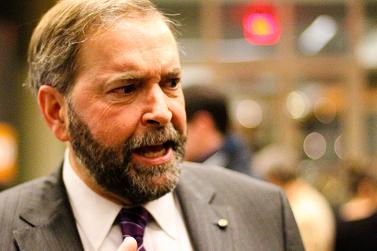It was Thomas Mulcair’s day in Parliament, but it was also a day to showcase NDP unity.
The Party took full advantage of the occasion, even using the generally ignored period for statements by members that precedes question period (QP) to showcase the other leadership candidates.
The Conservatives made use of that pre-QP space, too.
They have their take-no-prisoners, attack-all-the-time reputation to maintain.
Most of the media have focused on Conservative MP Jeff Watson’s attack statement, which was more or less a repetition of the “Mulcair the opportunist who gets along with nobody” talking points in Fred DeLorey’s memo and James Moore’s statements to media at the convention.
More telling and more ominous, however, was Conservative MP Devinder Shory’s guilt-by-association smear of NDP Immigration Critic Don Davies.
The Vancouver-Kingsway MP was a prominent caucus supporter of Mulcair. His crime, according to Shory, was taking part in an anti-racism event sponsored by the “anarchist group” No One Is Illegal. This, apparently, makes Davies a supporter of human smugglers, “bogus refugees” and worse.
Davies rose on a point of order to argue that Shory had misused the statements-by-members period to utter falsehoods about him, and, when Shory tried to rise to respond, found himself cut off at the pass by no less than Immigration Minister Jason Kenney.
Kenney told the House that Davies’ motion was not a legitimate point of order but a matter of “political debate.” And, of course, he added, every nasty thing his colleague had said about the Vancouver MP was absolutely true!
The Speaker said he would check Hansard and rule on the point of order at a later time.
As for Mulcair, he seems to have a comfortable capacity to let the heavy-handed stuff roll off his back.
In one interview, right after winning the leadership, he described Conservative attacks as “puerile” and said that anyone who thought he was an “opportunist” for choosing a party that had never won a seat in Quebec in a general election needed to consult a dictionary.
Party members — who might have been a bit nervous after Mulcair’s two speeches at the convention got generally tepid reviews — should be bolstered by his subsequent performances, not only in the House, but in a round of post-convention interviews.
Mulcair is many things politically, although it is impossible for James Moore who described him as “hard left” and the many on the left who are so leery of him to all be right!
But culturally, Mulcair is very much one thing few have noted: a typical Montrealer.
That rapid-fire delivery he has when speaking, with the ideas tumbling over each other like a series of barrels launched over Niagara Falls — that’s a Montreal style.
It’s not every Montreal person’s style. It is certainly not the all-too-laconic Brian Topp’s, for instance (although his time in Saskatchewan may have beat it out of Topp.)
But go to any bar in Montreal and you will hear folks conversing in that almost manic Mulcair manner, often simultaneously in two languages.
Will the NDP be well served by Mulcair’s hyper-energetic manner?
The members seem to think so, and the media seems to find it to be, if nothing else, not boring.
So far, after barely two days as leader, Mulcair in conversation and interview format seems more formidable than Mulcair at the podium.
But effective political communicators often have some fairly tedious speeches on their record.
The Governor of Arkansas gave one of the most excruciatingly long-winded and painful keynote addresses to the 1988 Democratic Convention.
It caused many to comment that he should go back to Little Rock and stay there.
That Governor was a fellow by the name of Bill Clinton.



